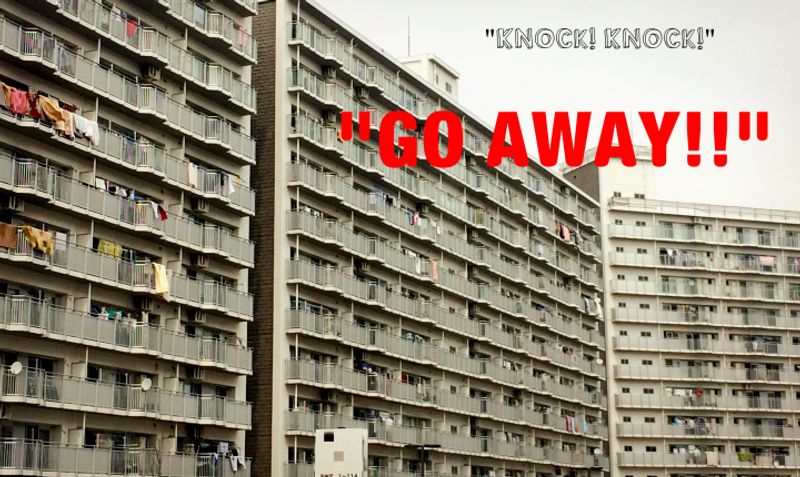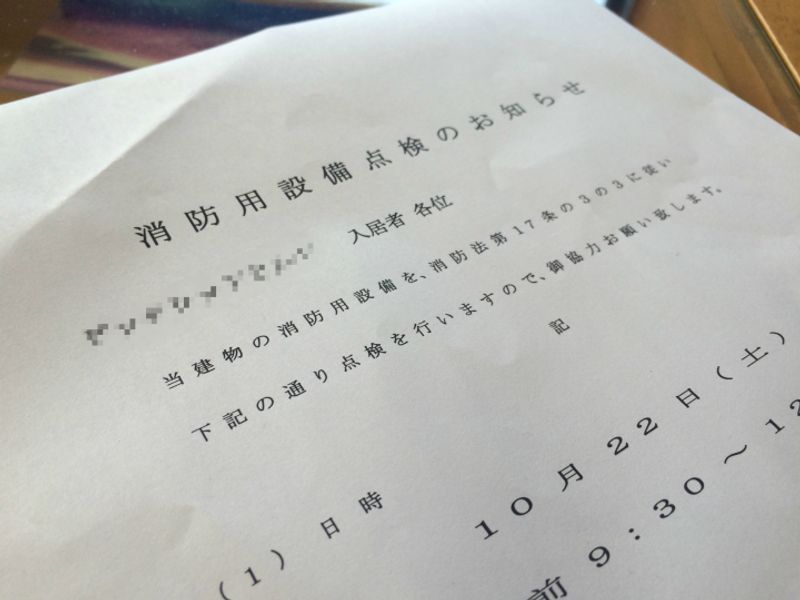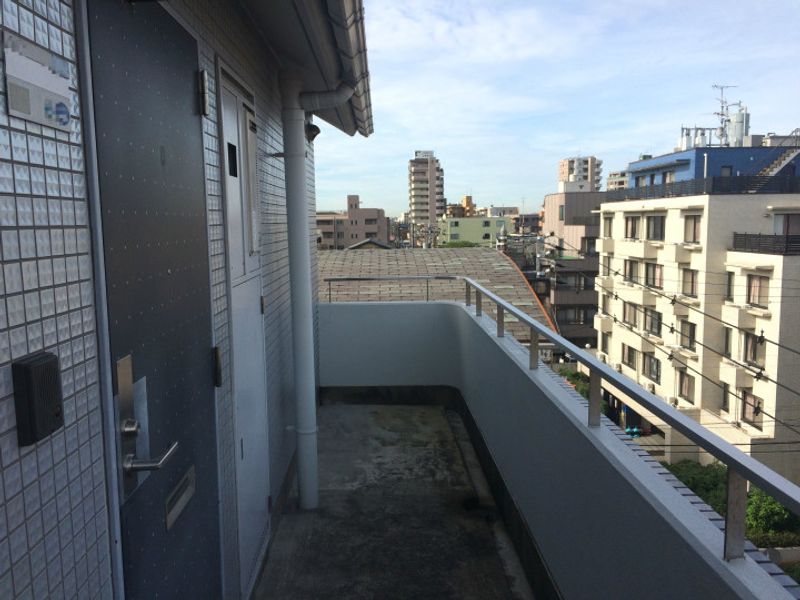Oct 4, 2016
Who’s that knocking on your door in Japan?

Back home the door-to-door salesperson that became the default object of rants, raves, and jokes used to be the poor bugger charged with trying to flog double glazing for your windows. An unpleasant undercurrent of violence and heinous crime in the nation’s manicured suburbs have largely put these people out of a job. These days sales operations are conducted out of call centers in India so aside from the odd politician, the chances of unknown entities knocking on your door have been reduced.
But how about in Japan? What prospect of someone knocking on your door (or pushing the buzzer button) thus stirring an expat into that panicked dilemma; Do I answer it? Should I just go full English, or do I try and negotiate the situation in Japanese? What if it’s the TV people?!
The other week an A4 printed notice was put in this expat’s letter box. I might have thrown it out with the forest’s worth of pizza delivery deals but it had a date on it and something told me I should show it to the (Japanese) partner. Turns out it was, to some degree, important. It was notification (the third one, apparently) that someone was going to come round to the apartment on a Saturday morning to check everything was as it should be with our gas supply. I was told to be in that particular morning. The gas guy duly came round, spent about 10 minutes doing some checks, asked me to sign something, gave me some leaflets, and then went on his way. Had this expat been flying solo, I’m not sure this check would have taken place, or how many times the people who organized it (and I’ve no idea who they are) would have, well, tried to organize it again.
So here we have one example of someone who might come knocking on your door in Japan. What of the others …
Smoke alarm people
A regular in the workplace, they skit into offices around the nation, alarm-checking selfie sticks in hand. Until recently (after moving crib) I’d never had these people come to my apartment. Again though, an unnoticed (on my part) notice was picked up by the partner, and again I was told to stay put of a Saturday morning.
Fire safety checks
A new one this (for me), and yet another of those innocuous A4 bits of paper in the letter box. Not to mention another Saturday morning to be spent in waiting. Between the hours of 9:30 and 12:00 residents of the building are to have fire extinguishers checked (I hope there’s not a practical test!), the evacuation(?) alarm systems given an airing, and sprinkler systems given the once over (They’re not going to turn it on, are they?). The notice says that individual apartment checks will take around 8 minutes. (See image below)

The TV people aka NHK
A constant bugbear for everyone in Japan. The problem with these guys is, no one’s sure about what to do with them. Rumours abound about how you don’t need to pay your fees. True? Err, not quite. As this expat understands it you are supposed to, it’s just that there’s no legislation in place to punish if you don’t. In place of any inappropriate advice however, allow me simply to recount my experience with the people from NHK …
… they’ve been to our apartment (old one) maybe three times. After each time the partner has chastised me for not answering the door (the thought being that a burst of English would have scared them away). Each time the partner has handled things and each time not paid any money or signed anything. The get out clause? The partner explains that the (other) partner isn’t in right now and that they need to be consulted before handing over money or signing anything. Do you have any leaflets I can read in the meantime? It’s worked so far. On one occasion the partner was so incensed by the rude manner of one of NHK's people who came calling, a formal complaint was made ... to NHK. Still didn’t (or haven’t) paid though.
Make of this what you will.
The girl next door
Calm yourselves fellas! We’re just doing a play on words. What we mean here is the occasion in which your neighbours come calling. Now, why on earth would they do this? One reason may well be because they are new. Not sure on the policy with this kind of thing but the partner and I did it after moving into our latest crib. Replete with some rather nice coffee from Starbucks (Although aside from the occasional greeting, we haven’t had substantial contact since. Maybe we needed an upgrade on the coffee). In the previous apartment a new neighbour once presented us with a gift card for use at convenience stores, to the tune of 3,000 yen! Others haven’t done anything.
It could also be that someone’s laundry or futon has landed on your balcony. This is a real possibility in Japan where balconies bear the brunt of the nation’s obsession with doing laundry (they do it a lot). A strong gust of wind, an overused and fragile 100 yen-store peg, or an overambitious overhanging of the futon can easily land someone in a situation where they have to make an embarrassing visit to the apartment below. If you’re on the other end of it however, you might be given a present to make up for the inconvenience (this expat once got a cake).
Lower down of the scale of possibility is that you’re about to be confronted over making too much noise, or doing something that has incurred the neighbour’s wrath. We use the word ‘unlikely’ because society here is, for the most part, not confrontational. What is more ‘likely’ is that if a neighbour has a complaint with you, they will take it to the landlord or the real estate agency (who will take it to the landlord on their behalf). That’s one of the reason’s you’ve coughed up the equivalent of one month’s rent, so they will do grubby tasks like this.

(Not just some random door, by the way)
Jehovah’s witnesses
No first-hand experience (in Japan) with these regulars of the door-to-door scene, but other expats have … on more than one occasion. They’ve obviously spotted a space in the market with largely secular Japan. Quite what kind of reception they’re getting from our hosts I can’t imagine, but a part of me would like them to show up at my door just so as I can compare their approach over to here with that from back home.
Scams
I would speculate that the expat in Japan is largely immune from the door-to-door scam. These things require a certain degree of mutual communication (even if it is being lead). They do happen in Japan though. As we discussed in an earlier post (Japan’s My Number Scams), when the government launched its My Number system and started to deliver notifications, plenty of unscrupulous sods saw this as ripe opportunity to start scaring already nervous people into handing over cash for something to do with the security of their My Number. Again though, it would be a surprise if these kind of scams were worth a try on the nation’s expats.
NB* The only people who have the right to see your My Number are HR personnel (at work), public/government officials, and civil servants.
Salespersons
Maybe not so much of this in Japan either. On occasion though you might be subject to a visit from an Internet provider trying to get you to switch to another team. Often though, a single provider is used by an entire block of apartments as organized by the owner of said building.
Points for the expat in Japan to be aware of
In regards to those easily missed A4 notices …
These kind of checks look to be obligatory in the sense that the building management or owner has to make efforts to carry them out. From the point of view of the unknowing expat, there’s little to worry about. If you ignore these notices the worst that could happen is that you receive a call from the landlord. Back in this expat’s homeland, in situations like this the landlord has the power, and the right (and a key) to come round to a tenant’s place and let these people in to do their checks. Obviously landlords will call tenants ahead of time, but there’s no obligation/requirement for the tenant to be present. It seems the same can’t be said of Japan, where landlords cannot let themselves in without prior agreement with the tenant.
NB* 点検 / tenken = inspection. Look out for this on those A4 bits of paper.
It should be standard practice in Japan, but anyone coming to your door on behalf of a legitimate/above board organisation or company will have ID on them. They would usually identify themselves in an appropriate way without being asked. If they don’t, this should put you on your guard (although it could also be an innocent miss).
Where money is involved ...
Don’t underestimate some of these people. A local friend who used to do door-to-door sales in Japan told me that when it comes to sales or collecting money these people are potentially well organized. Repeated visits and interaction with residents may have allowed them to build up a veritable database on what kind of person lives where, and what kind pitch delivered by what kind of person will work best. Whilst the expat might want to go down the speaking-in-a-foreign-language-will-scare-them-away-forever route, the same route may also be noted when they get back to HQ, resulting in someone adept at, well, probably English, being sent back for another go. This isn’t grounded in provable fact, but nonetheless, something to be aware of.
Help us out here. What door-to-door experiences have you had during your time in Japan? How do you deal with them? Let us know in the comments section below.
For similar content, how about …
Living In Japan: Troubleshooting Common Apartment Problems
See us on …
Twitter: @City_Cost_Japan
Facebook: @citycostjapan



3 Comments
helloalissa
on Oct 4
Usually Yamato or JP delivering something, sometimes sales; we had the gas check one recently. We have one of those phone intercoms so usually my husband will check who it is first, often leaving it at 'kekko.' when it's sales. About NHK, they aren't allowed to charge you if you have no TV (and will probably not ask to come in and check, if you actually do). I've heard a simple, 'What?' will usually scare them off.
City-Cost
on Oct 5
@helloalissa Thanks for sharing. That's interesting about NHK. Wonder if they ever do ask to come inside and check?
Ely2500
on Sep 29
If u said u dont have a tv, they will sometimes even ask to see your phone if u actually watch the tv from there which is ridiculous.